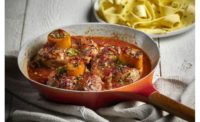After an absence of 20 years, beef from the United Kingdom is now available to purchase in the United States. One of the companies leading the way is Foyle Food Group, a Northern Ireland processor that sent the first shipment of UK beef out of its facility in Campsie. That initial shipment is the beginning of what the company hopes is a successful new market.
“Eventually as more Foyle plants are approved, we should be able to increase exports,” explains Michael Acheson, business development. The company has a total of five facilities, with three in Northern Ireland and two in England.
When the first shipments left Campsie on September 30, it officially ended a ban on EU products that was introduced in the wake of a BSE (bovine spongiform encephalopathy) outbreak in 1996. Market access for UK beef was granted in March 2020.
According to the UK Agriculture and Horticulture Development Board (AHDB), the news means the sector can now begin to reap the economic benefits of trade with the U.S. – with industry estimating beef exports will be worth £66 million over the next five years.
Acheson says that the Foyle Group, like other beef exporters who gain clearance to ship to the United States, are varied. “There are opportunities to supply into processors, specialty cuts in Latino and Asian markets, and eventuality a chance to promote the traditional breeds of Britain. The UK is the birthplace of Angus and Hereford,” he says.
The process of gaining certification to export to the United States was a six-year effort, Acheson says. The first stage of these approvals is for the veterinary/competent authority to work with the U.S. and gain as much equivalence as possible between the control in the UK and the requirements within the U.S.
“It required some changes to our current procedures to ensure that we complied with U.S. procedures, protocols and legislation,” he adds. “For the U.S. approval process, there is a list of requirements that we must comply with to gain approval, a 20-day trial had to be completed once the procedural side of things was agreed, and a further two-day audit was undertaken before the green light was given.”
The FSIS Audit Report, a crucial step leading to British exporters being able to sell to the US, was published in March 2020, and confirmed that UK meat hygiene systems and controls are of a suitable, equivalent standard for products to be imported to the U.S. The report noted that the whole of the UK meets U.S. production requirements, therefore beef from England, Wales, Scotland and Northern Ireland is eligible for exports.
Now that UK beef is officially in the U.S. marketplace, Foyle Group believes that its characteristics will appeal to American consumers. Claims-based meats are increasingly in demand here, and Acheson says that the company’s beef ticks the right boxes. For example, a majority of the country is covered in lush grass, and the mild climate allows for UK beef cattle to spend more time to graze in the fields.
“At the heart of the Foyle Food Group we have four exclusive producer clubs, which sees our agricultural experts working closely with the Foyle farmers to share knowledge and promote mutual understanding,” he adds. “Using practices and husbandry techniques handed down the generations – such as herd health planning and grassland management – cattle are raised with the aim of producing beef with superior flavor and texture.”
The official opening of the American market is a bright spot for what has been a challenging year for the UK meat industry. The onset of the Coronavirus has led to disruptions, as it has in the United States. Foyle Group has adopted site-specific COVID steering teams to oversee changes like adjusting shift patterns, workplace layout and employee behavior and culture.
“We have gone over and above the local government advice to help manage the community transmission into the factory,” Acheson notes. “Audits and verification tiers have been rolled out across the group to ensure compliance with the fast practical measures, procedures, and policies in place.”
Foyle Group also acted quickly to compensate for the shutdown of the foodservice and hospitality industries.
“In the space of nine days we were able to launch an own-label offering into a major retailer which provided nearly one million plates of steak for shoppers which would have otherwise ended up in lower value cuts,” he says.








